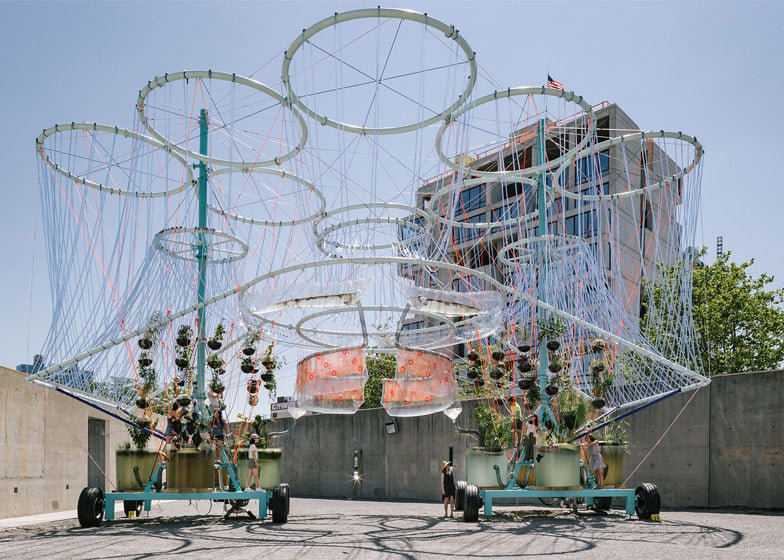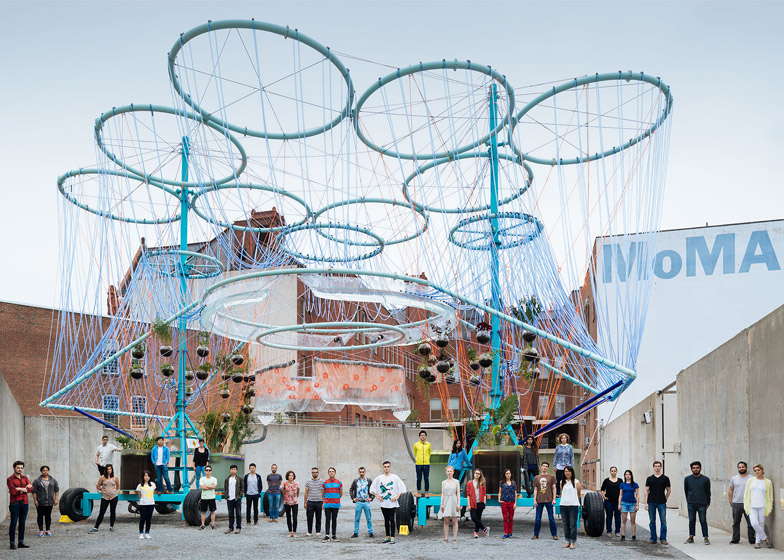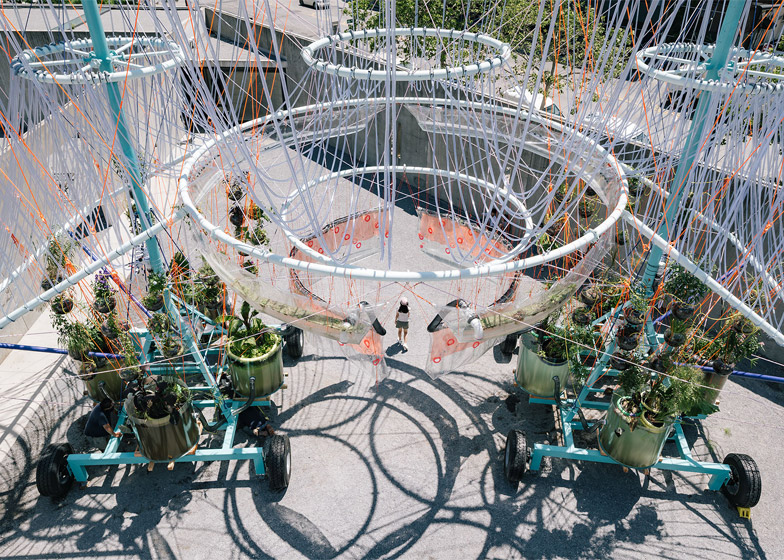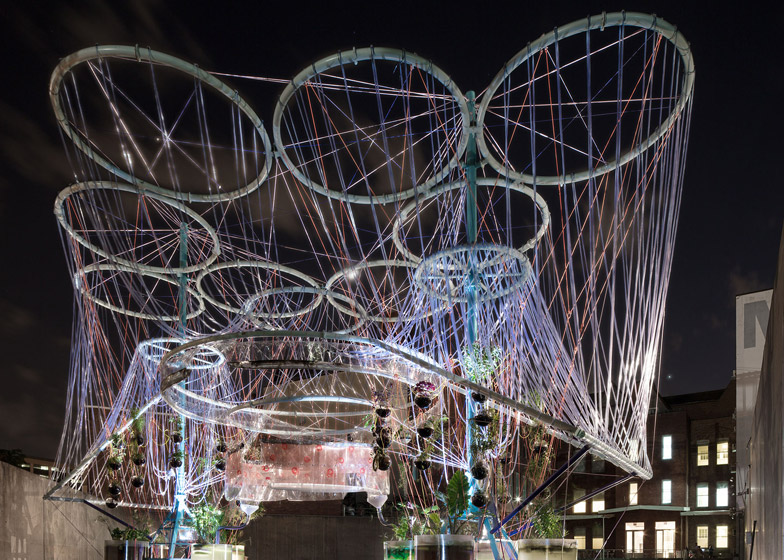Spanish architect Andrés Jaque has created a towering network of water-purifying pipes for this year's courtyard installation at MoMA PS1 in Queens, New York (+ slideshow).
Jaque and his firm Office for Political Innovation were the winners of the 2015 Young Architects Program (YAP), which invites emerging architects to create a temporary structure for the courtyard at PS1, a contemporary art institution affiliated with New York's Museum of Modern Art (MoMA).
Jaque's installation, called Cosmo, is designed to serve as a portable water-filtration plant.
"More than 2 billion gallons of water circulate every day beneath New York City," said the firm. "Cosmo is a movable artefact, made out of customised irrigation components, to make visible and enjoyable the so-far hidden urbanism of pipes we live by."
The installation, which opened yesterday, consists of a towering network of circular pipes set within a web of plastic tubes. At the base of the structure, cylinders filled with plants and water sit on wheeled platforms. Dangling from lower portions of the web are additional plants in clear, bulbous containers.
Polluted water supplied by the city's environmental protection department will continuously flow through the system. The water "has been engineered to represent the average pollution level of used water that is discharged from the East River," explained Jaque, citing the waterway that runs between Queens and Manhattan.
The system will purify the water by eliminating suspended particles and nitrates, balancing PH levels, and increasing the amount of dissolved oxygen. It will take four days for 3,000 gallons of water (11,350 litres) to complete one purification cycle.
Plastic mesh at the base of the installation will glow automatically when a purification cycle is finished. "With Cosmo, the party is literally lit up every time the environment is being protected," said the studio.
The concept stemmed from a desire to address the issue of water shortages. The firm cites a United Nations statistic estimating that two-thirds of the global population will live in areas without sufficient water by the year 2025.
"Our office is focused on exploring the political role of architecture," Jaque told Dezeen. "The infrastructures by which we define how we relate to nature tend to be hidden domains reserved to experts: water treatment plants, reservoirs, electricity production facilities."
"All of them are so important to defining the way our societies get organised, but they are not spaces to be inhabited. We think there is a great potential to turn them into inhabitable spaces."
Cosmo is meant to trigger awareness and dialogue about water shortages and to serve as a prototype that can be reproduced around the world. It's also intended to be a "party artefact" that goes "wherever the party happens".
"It is a device meant to gather people together, as pleasant and climatically comfortable as a garden and at the same time as visually rich as a mirrored disco ball," said the firm.
Office for Political Innovation beat out four other firms for the commission: Brillhart Architecture, Erin Besler, The Bittertang Farm and Dillenburger/Hansmeyer. An exhibition featuring the five finalists' proposals will be on view this summer at MoMA.
The designers are required to incorporate water, shade and seating into their schemes.
"This year's proposal takes one of the Young Architects Program's essential requirements – providing a water feature for leisure and fun – and highlights water itself as a scarce resource," said MoMA architecture and design curator Pedro Gadanho earlier this year.
Cosmo will be on view until 6 September, coinciding with the Warm Up music series, which takes place in the courtyard every Saturday during the summer.
This is the 16th edition of the Young Architects Program, which launched in 2000. Previous installations include Wendy by HWKN, Pole Dance by SO-IL and Hy-Fi by The Living. In addition to New York City, YAP is now offered in Rome, Santiago, Istanbul and Seoul.
Office for Political Innovation, based in Madrid and New York City, was founded in 2003 by Jaque.
The architect is best known for his Phanton installation, which involved filling Mies van der Rohe's Barcelona Pavilion with junk from its basement, but he also received a Silver Lion at the 2014 Venice Architecture Biennale for the project Sales Oddity – part of the Monditalia exhibition at the Arsenale.
"I am not interested in objects themselves, but rather the way some things relate to others," Jaque told Dezeen.
"In this respect, we try to do an architecture that works more as an ecosystem than as a container. This way of designing has very little to do with sustainability, but a lot with political ecology."
Photography is by Miguel de Guzmán.
Project credits:
Project team: Andrés Jaque, Patrick Craine, Jocelyn Froimovich, Roberto González García, Laura Mora, Sebastian Bech-Ravn, Yannan Chen, Ilgaz Kayaalp, Nicolò Lawanski, Jorge López Conde, Senne Meesters, Jorge Noguera Facuseh, James Quick, Jarča Slamova




